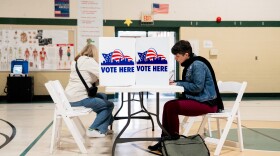-
Missouri lawmakers in 2022 passed a sweeping elections bill that included a photo ID requirement to vote and limitations on registering voters. Challenges to both provisions were heard at the Missouri Supreme in separate cases.
-
A Missouri judge threw out a lawsuit from the Missouri NAACP and other groups challenging the state's law requiring a government-issued ID to vote. But the plaintiffs say "the court got the test wrong" and ignored the burden the law places on voters.
-
Missouri lawmakers passed legislation in 2022 that established a photo ID requirement at the polls. The NAACP and voting rights group had sued, arguing that its intention was to disenfranchise large groups of people.
-
Missouri's legislature passed a law in 2022 allowing two weeks of "no excuse absentee" voting before Election Day. It's already proving popular, with turnouts approaching 20% of the total cast four years ago. Voters aren't dissuaded by the long wait times, though.
-
Missouri's GOP leaders added an amendment to the November ballot that would explicitly ban noncitizen voting. It comes as Donald Trump and his allies zero in on the baseless claim that Democrats are encouraging newly arrived migrants to vote for them — despite no evidence of such a thing.
-
Missouri voters: Oct. 9 is your deadline to register to vote for the November election. The deadline for Kansas is Oct. 15.
-
An LGBTQ+ advocacy group says the Missouri Department of Revenue's recent policy change to identifying documents poses challenges for trans and nonbinary people.
-
Officials in Missouri voting offices worry about Election Day problems, especially for voters who have recently moved, since the state pulled out of a collaboration that helps check voter rolls for accuracy.
-
A Missouri trial that wraps up this week could determine the fate of the state’s controversial voter ID law and shape the results of the 2024 election. At stake are requirements that some say are intentionally designed to suppress votes in Democratic-leaning metro areas.
-
The NAACP and the League of Women Voters are challenging Missouri's 2022 voter ID law, arguing it imposes unconstitutional burdens on the right to vote without actually achieving the stated goal of reducing fraud. Two previous attempts by Missouri Republicans to require voter IDs have been struck down by the courts.
-
Missouri heads to trial over voter ID law accused of disenfranchising elderly and disabled residentsA trial starting Friday will be the third time Missouri courts have weighed the merits of a law intended to combat fraud against right to vote without interference. Twice before, Missouri's photo ID requirements have been struck down as violations of the state’s constitution.
-
Valerie Lemmie discusses how people can build trust in their communities and continue the battle of keeping democracy alive.
Play Live Radio
Next Up:
0:00
0:00
Available On Air Stations










